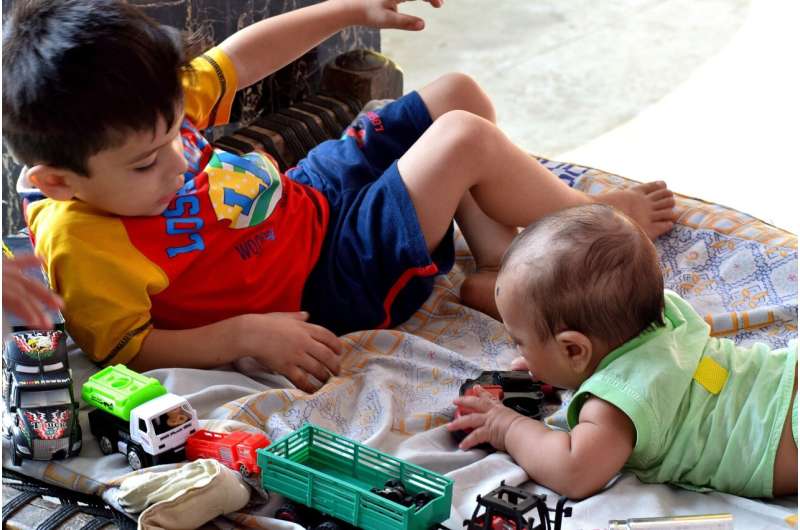This article has been reviewed according to Science X's editorial process and policies. Editors have highlighted the following attributes while ensuring the content's credibility:
fact-checked
peer-reviewed publication
trusted source
proofread
Interactive language during playtime helps build kids' spatial skills

The way parents interact with their children during playtime strongly influences the development of spatial skills—a predictor of success in science, technology, engineering and mathematics (STEM) fields.
FIU Center for Children and Families (CCF) researchers led a study recently published in Developmental Psychology to understand how certain parenting behaviors, particularly those involving positive reinforcement and spatial language, influence a child's cognitive development.
They observed parents and their children as they played together with LEGOs and found that parents who offered praises ("great job!") or described their children's actions ("I see you are building a tall tower") also used words that describe shapes, sizes, spatial features, locations and orientations of objects and spaces. When children hear their parents use this type of language at an early age, it can form a foundation for the skills they'll need to succeed in STEM.
"These findings are significant because they highlight the connection between parenting behaviors and the use of spatial language with children," said LaTreese Hall, FIU doctoral student in developmental science and the study's lead author. "This connection opens up the possibility that interventions aimed at improving parent-child interactions could also lead to increased exposure to spatial language for children, potentially benefiting their cognitive development."
The findings of this study support previous CCF research suggesting that parents who provided more socioemotional support through positive parenting practices were more likely to offer richer language input, enhancing their children's cognitive development.
"Spatial skills are essential for success in STEM fields, and previous research has shown that when parents use spatial language with their children, it can significantly boost the development of these critical skills," said Shannon Pruden, FIU psychology professor, director of the Project on Language and Spatial Development, and senior author. "We wanted to uncover which parenting behaviors were associated with the production of more spatial language so that we can enhance the likelihood of children being exposed to a wide variety of such language."
Researchers recommend for parents to find ways to incorporate positive parenting practices such as praises, behavior descriptions and reiterations, alongside discussions about shapes, sizes and spatial features when playing with their young children.
Hall plans to conduct follow-up investigations. Her plan is to delve deeper into the effects of parenting interventions on not only improving positive parenting behaviors, but also increasing parents' use of spatial and number language with their children.
More information: LaTreese V. Hall et al, "You did a great job building that!" Links between parent–child prosocial talk and spatial language., Developmental Psychology (2023). DOI: 10.1037/dev0001574



















